By Dr Minh Alexander NHS whistleblower and consultant psychiatrist 24 February 2019
Summary: Whistleblowers are always interested in private companies that employers may hire to undertake whistleblowing investigations. An example is CMP Resolutions, a company whose Business Development Manager wrote an article in the Health Service Journal on 21 February 2019 about how internal whistleblowing investigations come to “comfortable outcomes”. Some information about CMP Resolutions is collated here.
Introduction
Whistleblowers need a truly independent investigation mechanism when local investigation fails. There are examples in other jurisdictions of statutory whistleblowing bodies which have powers and which carry out this function. Such a body is required in the UK to protect the public. It needs to have robust arrangements for parliamentary scrutiny, constant refreshment and safeguarding against capture. To achieve this, real legislative reform and replacement of the current ineffective UK whistleblowing law.
Robert Francis fudged in his Freedom To Speak Up report and instead gave NHS whistleblowers:
- A powerless National Guardian’s Office which explicitly has no remit to investigate whistleblowers’ concerns
|
Page 169 of the report of the Freedom To Speak Up Review: “7.6.13 I want to emphasise that I am not proposing an office to take over the investigation of concerns. As I have already said, this needs to remain the responsibility of the local organisations.”
|
- An insincere assurance that there could still be ‘independent’ investigation of whistleblowers’ concerns if employers outsourced investigations.
|
Page 129 of the report of the Freedom To Speak Up Review: “Action 8.1 All NHS organisations should devise and implement systems which enable such investigations to be undertaken, where appropriate by external investigators, and have regard to the good practice suggested in this report.”
|
In relation to this, Robert Francis made a vague proposal that:
“The trust has access to a panel of trained investigators, who can respond quickly and with the necessary level of expertise.”
Action on Francis’ Recommendation 8.1 was recorded in the annex of the Freedom To Speak Up Review report as an action for: “All orgs incl. providers”.
However, four years on, there is no evidence that the government and senior NHS officials have taken any action to put in place a panel of properly trained investigators. Neither have I heard Francis raise concerns about the failure to implement his recommendation or ensure a properly managed external investigation system for NHS whistleblowing.
Instead, NHS regulators have called in private companies like Deloitte to review governance in some high profile whistleblowing cases, such as at the Royal Wolverhampton NHS Trust.
They have also outsourced investigations to niche private investigators, many of whom are former NHS managers. An example of this is the investigation that NHS Improvement commissioned into an executive whistleblowing scandal at Wirral Teaching Hospital NHS Foundation Trust.
Investigations commissioned and paid for by employers can go badly wrong for whistleblowers. In the case of Hayley Dare West London Mental Health Trust whistleblower, her chief executive offered her an independent investigation into her concerns, but it turned out that he intended that this be carried out by Capsticks the trust’s solicitors:
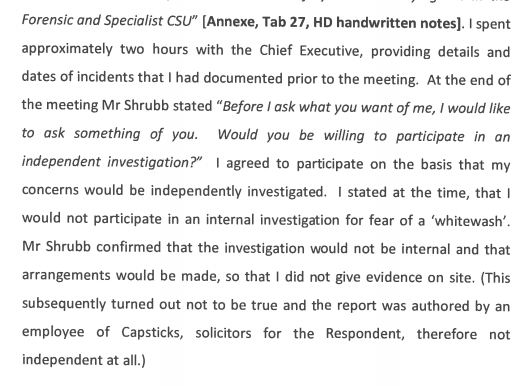
In the above context of the NHS’ approach to whistleblowing investigations, I provide below some information about the company CMP Resolutions and the recent HSJ article by its Business Development Manager.
CMP Resolutions or Conflict Management Plus Limited, Companies House 3880628
On 21 February 2019 the Health Service Journal, whose editor said it was a privilege to “serve healthcare leaders”, published an article by Richard Peachey, the Head of Business Development at CMP Resolutions:
“In-house whistleblowing investigations rush to comfortable outcomes”
According to CMP Resolutions’ website, the company sells amongst other services, expert investigations into whistleblowing cases:
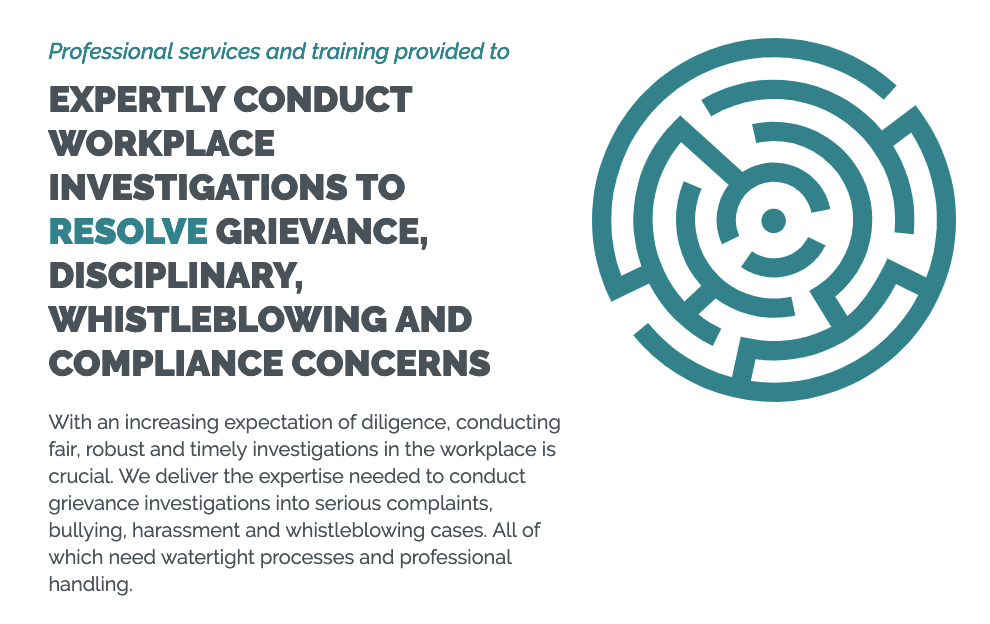
But Peachey’s HSJ article seems somewhat ambivalent about the value of whistleblowing:
| “We’re in a new age of speaking up, when taking on authority feels right and proper. Employees in all kinds of organisations now have the models, precedents and language they need for going public.
But in the singular NHS context of extreme public scrutiny and emotional pressures, encouraging more whistleblowing isn’t necessarily going to do anything for the working environment or stress levels. Whistleblowing is a dangerous weapon when it’s used for malicious purposes, as a means of escalating grievances against management. NHS employers quickly need to find a smart, grown-up balance between buttoned-up secrecy and a whistleblower’s charter. The difficulty of finding this balance may well be the reason why it’s four years since the “Freedom to Speak Up” review and yet the topic is more fraught than ever.” |
The above comments do not frame whistleblowing in the public interest as a prosocial behaviour and an expression of fundamental democratic values and human rights to free speech. Instead, they imply that whistleblowing is a matter for bosses to manage, and they give prominence to the employer-centric narrative about ‘malicious’ whistleblowing in bad faith.
Is this the right approach in a safety-critical sector?
Who is Richard Peachey? According to his LinkedIn pages, he has had varied jobs. None of them obviously relate to the NHS or to whistleblowing.
There are also LinkedIn pages for other CMP Resolutions officers:
There seems to be little link generally between CMP Resolution’s officers and the NHS.
Its Chair according to her LinkedIn page, was a publications manager at the Kings Fund for three years:

Arran Heal, CMP Resolution’s Managing Director’s LinkedIn page states that he is a proven visionary who has worked for Coca-Cola and then set up a business selling drinks to hospitals:

Liz McCaw CMP Resolutions NED according to her LinkedIn page is a coach for the Faculty of Medical Leadership and Management:

Perhaps of greatest potential interest to whistleblowers is CMP Resolution’s Head of Investigations, Tim Kingsbury.

According to his LinkedIn page, he served mainly in the Royal Navy:

Overall, the background of CMP Resolutions’ officers is essentially corporate and administrative.
CMP Resolutions’ website describes the company as “the UK’s leading workplace investigation company”.
CMP’s Chair’s LinkedIn page also states that the company is the UK’s foremost provider of dispute resolution services:

According to papers filed at Companies House, this is the (unaudited) balance sheet for the company in the year ending 31 March 2017:

These are publications by CMP Resolutions:
How the best employers create a clear air workspace
The content about whistleblowing in these reports is generic and broad.
According to CMP Resolutions’ website, the Department of Health and at least two NHS trusts (South East Coast Ambulance Services and Wrightington, Wigan and Leigh NHS Foundation Trust) have been clients:

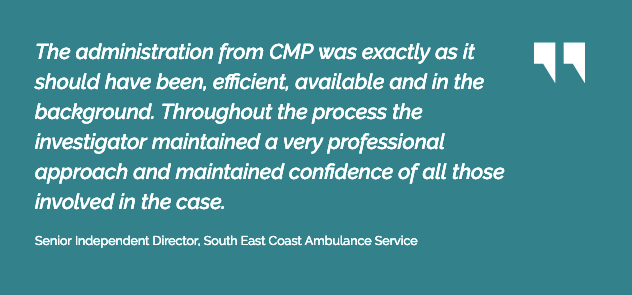
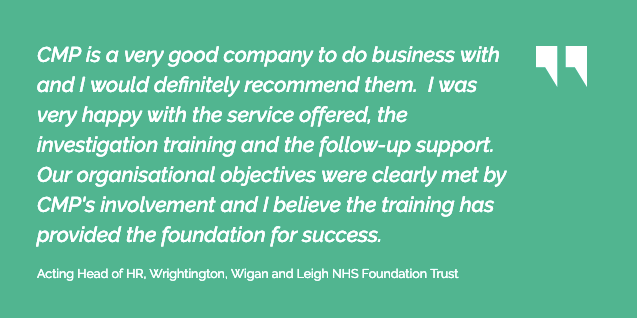
I leave it with readers to make their own minds up about how organisations such as this would handle very complex and fraught NHS whistleblowing cases. For example, those of the CQC whistleblowers who raised concerns about their senior leadership team, or others.
UPDATE 25 FEBRUARY 2019
Underlining the problems with outsourcing governance reviews and whistleblowing investigations, and the control exerted by the purchasing organisations, the Health Service Journal today reported that NHS England has tried to bury an external review that it commissioned on governance issues at Sheffield CCG. This included alleged bullying, cover ups and whistleblowing at the “toxic” CCG.
“The review was carried out by a former Primary Care Trust chief executive Denise McLellan, who questioned 87 people.”
The CCG’s Medical Director Dr Zak McMurray has reportedly been on “special leave” for a year, after whistleblowing:
|
“During a later public meeting on an unrelated topic, Dr McMurray, who was one of those who raised a concern, spoke out about plans to cut back on Procedures of Limited Clinical Value. Following this, he was put on so-called special leave in February 2018. The CCG would neither confirm nor deny Dr McMurray’s absence on full pay. But Dr McMurray told HSJ in a statement: “I can confirm that I have been on special leave for just over a year now. I wish to reassure my patients that my absence is not due to a disciplinary process and is not conduct or ability related. I am unable to comment further at this time.” Key findings from the NHS England review into Sheffield CCG include: · Poor decision-making processes which resulted in frustration and poor behaviours by senior staff; · Disagreements between executive team members which were not addressed effectively or handled properly in line with NHS values; · Widespread dissatisfaction about how bullying and harassment cases were handled; · A leadership team which lacked a clear strategy, while stakeholders were not confident the executive team had the right skills to lead the CCG; · An ongoing investigation involving governing body members putting the organisation under strain and communication had been poor; · Stakeholders panels for senior appointments which felt their views were ignored without feedback; and · Internal career progression opportunities which were not fairly offered. The review acknowledged Sheffield CCG, which was rated “good” by NHS England in 2018, has a number of strengths, with committed staff and plans to further transform services. HSJ asked NHS England a number of questions about whether it was aware of the whistleblowing incidents, the concerns about the CCG and Dr McMurray’s “special leave” but it declined to provide a response.” |
RELATED ITEMS:
What could a new whistleblowing law look like? A discussion document
CQC’s Victimisation of Whistleblowers: Failure to Investigate Concerns
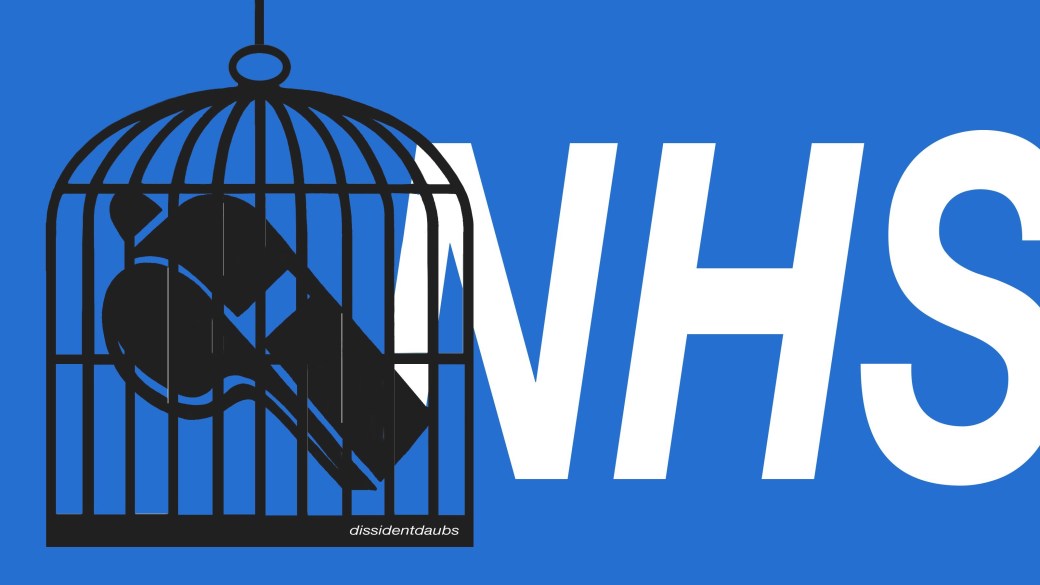


I thank you for this post.
As a thought leader and someone dedicated to comfortable outcomes – particularly for those responsible for dereliction of their duties – I must be qualified to suggest what the bottom line appears to be.
And, the ultimate purpose of these non-investigatory bodies being seconded to address whistle-blowing issues within the NHS, is that they can be highly profitable whilst guaranteeing that what they may decide to discover and record will not impinge in any way on the workings of the NHS whether detrimental to vulnerable patients or to morally-armed whistle-blowers.
At the same time, they will act as an additional buffer between the genuinely aggrieved and those who are responsible but callous and dim. I wonder how many of these bolt-on, bureaucratic irrelevances the NHS can bear before it collapses under the weight.
As an aside, it’s fascinating to see how the wicked always manage to turn whatever disaster happens, whether they are responsible for it or not – into a tool that benefits them.
They’re like barnacles on the bottom of a ship.
Kindest,
Zara.
LikeLike
Hi! I am Richard Peachey, CMP’s Head of Business Development, I am also a committee member for the Healthcare People Management Association, which CMP have been supporting for more than a decade.
Our site is very generalised because we support every sector, so I am sorry that we are not more clear about how we support healthcare.
My comments about speak up were never intended to undermine its value. They were designed to ignite a conversation about promoting speaking up without the need for a formal process, and this is only really possible through the development of a culture of open and honest communication.
The record of reprisals against whistleblowers is huge, and we need to get healthcare employers to a position where they accept and welcome concerns.
If you’d like to discuss this further, please do contact me.
Richard.Peachey@CMPsolutions.com
Best wishes.
LikeLike